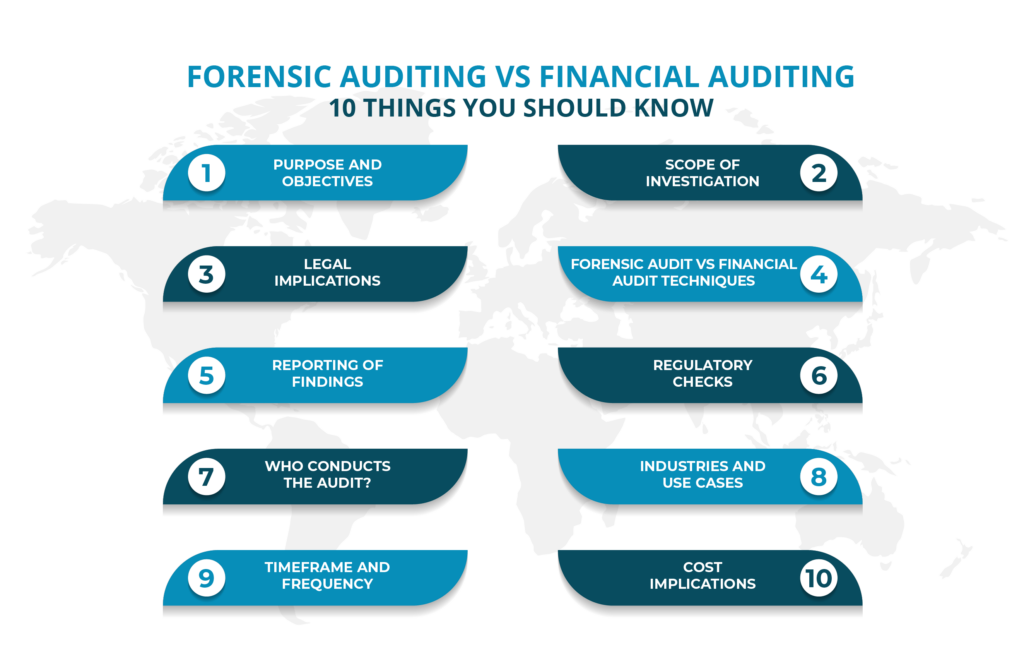Forensic Auditing Vs Financial Auditing - 10 Things You Should Know

In finance you should always prioritize maintaining 100% financial integrity!
For getting that there are two types of audits that serve different purposes. One is forensic auditing and the other one is financial auditing.
While both involve examining financial records, their objectives, methods, and outcomes differ.
In this blog post we are going to talk about the ten things you should know about forensic auditing vs financial auditing.
Purpose and Objectives
Forensic Auditing
Fake or Altered Documents
Scope of Investigation
Forensic Auditing
Forensic auditors conduct in-depth investigations into financial irregularities. They may review transactions, contracts, emails, and other records to detect things like money laundering.
Financial Auditing
Financial audits focus on verifying financial statements. They also check compliance with Generally Accepted Accounting Principles (GAAP) or International Financial Reporting Standards (IFRS). Overall, the scope is broader but not necessarily investigative.
Legal Implications
Forensic Auditing
Financial Auditing
Financial audits do not typically result in legal action unless material misstatements are discovered. The primary purpose is to give guarantee to investors, regulators, and management that the financial statements are accurate.
Looking for forensic audit services?
MHR services includes Audit & Assurance, Financial Accounting, Financial & Business Advisory, Taxation including VAT, Corporate Tax & Excise Tax, Company Setup, regulatory & compliance and Management Consultancy.
Forensic Audit Vs Financial Audit Techniques
Forensic Auditing
- Data analytics for detecting anomalies
- Forensic accounting software for transaction analysis
- Interrogations for gathering evidence
- Tracing hidden assets
Financial Auditing
- Sampling techniques for reviewing transactions
- Internal control assessments for calculating risk
- Analytical procedures for identifying inconsistencies
Reporting of Findings
Forensic Auditing
Financial Auditing
- Unqualified (clean) audit report (if statements are accurate)
- Qualified audit report (if issues are found)
- Adverse opinion (if statements are materially misstated)
- Disclaimer of opinion (if insufficient information is available)
Regulatory Checks
Forensic Auditing
Forensic audits are conducted based on investigative requirements rather than routine compliance. They follow legal guidelines which involve working with law enforcement agencies.
Financial Auditing
Financial audits comply with accounting standards. There’s special attention to industry best practices such as GAAP, IFRS, and Sarbanes-Oxley Act (SOX).
Who Conducts the Audit?
Forensic Auditing
Forensic audits are conducted by forensic accountants. There are also fraud examiners, or specialized forensic audit firms. These professionals are often certified as Certified Fraud Examiners (CFE) or Certified Forensic Accountants (CrFA).
Financial Auditing
Financial audits are conducted by external auditors, often Certified Public Accountants (CPAs). Internal auditors may also perform financial audits within an organization.
Industries and Use Cases
Forensic Auditing
- Corporate fraud investigations
- Bankruptcy cases
- Mergers and acquisitions (M&A) disputes
- Tax evasion cases
- Embezzlement or corruption investigations
Financial Auditing
- Public companies (for regulatory compliance)
- Private businesses seeking investor confidence
- Government agencies and nonprofits
- Banks and financial institutions
Timeframe and Frequency
Forensic Auditing
Forensic audits are not conducted regularly but rather on a need basis when financial misconduct is suspected. They can take weeks or months, depending on the complexity of the case.
Financial Auditing
Financial audits are conducted periodically, typically annually, as part of a company’s financial reporting process. Some businesses also conduct quarterly audits for internal review.
Cost Implications
Forensic Auditing
Financial Auditing
Financial audits are comparatively less expensive, as they follow standardized procedures. The cost depends on the size of the organization along with the extent of financial records reviewed.
Forensic auditing investigates fraud, while financial auditing ensures accuracy in financial statements.
It is required in cases of fraud, financial disputes, or legal investigations.
It verifies financial accuracy, ensures compliance, and builds stakeholder trust.
No, forensic audits focus on legal evidence, while financial audits follow accounting standards.
Yes, forensic audits provide legal evidence for fraud and financial crimes.
They analyze transactions, trace funds, and examine records for fraud.
Annually, or as required by regulations and stakeholders.
Suspicious transactions, whistleblower reports, or legal investigations.
Yes, they require specialized skills, in-depth analysis, and legal expertise.
Financial audits are done by CPAs, while forensic audits require forensic accountants.
Conclusion
That’s a wrap for ‘Forensic Auditing Vs Financial Auditing – 10 Things You Should Know’
Both forensic auditing and financial auditing is needed for getting that financial integrity!
However, they serve distinct purposes. Forensic audits are investigative and legal-focused, while financial audits are compliance and accuracy-focused.
Understanding the differences between these two audit types helps businesses take appropriate measures to safeguard financial interests.
So, whether you’re preventing fraud or getting financial compliance, choosing the right audit type is necessary for maintaining trust in financial operations.













